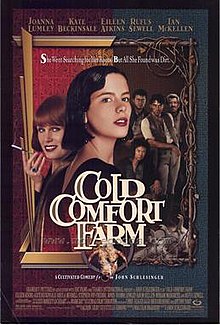Cold Comfort Farm (film)
| Cold Comfort Farm | |
|---|---|
 US theatrical release poster | |
| Based on | Cold Comfort Farm by Stella Gibbons |
| Screenplay by | Malcolm Bradbury |
| Directed by | John Schlesinger |
| Starring | |
| Music by | Robert Lockhart |
| Country of origin | United Kingdom |
| Original language | English |
| Production | |
| Producers | Alison Gilby Richard Broke |
| Cinematography | Chris Seager |
| Editor | Mark Day |
| Running time | 95 minutes |
| Production company | Thames Television |
| Distributor | BBC |
| Release | |
| Original release |
|
Cold Comfort Farm is a 1995 British comedy film directed by John Schlesinger and produced by the BBC and Thames Television, an adaptation of Stella Gibbons' 1932 book of the same name, the film stars Kate Beckinsale, Joanna Lumley, Ian McKellen and Rufus Sewell. Originally broadcast on 1 January 1995 on the BBC, it was Schlesinger's final film shot in his home country of Britain, and was picked up for theatrical release in North America through Gramercy Pictures, where it was a small success.
Plot[]
After the death of her estranged parents, young Flora Poste, who aspires to be a writer, decides that the only way for her to live whilst researching her writing is to stay with relatives.
Her city-based relatives show no interest, so Flora sends letters to her country relatives. There are a few responses, most of them unsuitable, but one is intriguing. Flora decides to stay for a while with the Starkadder family on their rundown farm.
The Starkadders are an assortment of rustic, uncouth, and truly eccentric characters, each of whom has a hurdle (be it physical, emotional, or spiritual) to overcome before reaching his or her potential.
Flora quickly realises that, as a modern twentieth-century woman, she can resolve these situations once she has assessed and solved each character's problems. Whilst she is doing so, she is pursued by an unsuitable suitor, a most obnoxious character, whom she has difficulty avoiding.
Cast[]
- Kate Beckinsale as Flora Poste
- Joanna Lumley as Mrs. Mary Smiling
- Ian McKellen as Amos Starkadder
- Rufus Sewell as Seth Starkadder
- Eileen Atkins as Judith Starkadder
- Sheila Burrell as Ada Doom
- Stephen Fry as Mybug
- Freddie Jones as Adam Lambsbreath
- Miriam Margolyes as Mrs. Beetle
- Ivan Kaye as Reuben Starkadder
- Jeremy Peters as Urk
- Maria Miles as Elfine Starkadder
- Christopher Bowen as Charles Fairford
- Louise Rea as Meriam Beetle
- Sophie Revell as Rennet
- Rupert Penry-Jones as Dick Hawk-Monitor
- Angela Thorne as Mrs. Hawk-Monitor
- Harry Ditson as Earl P. Neck
Production[]
The film was edited at Rank Film Laboratories, part of The Rank Organisation. The film itself reached a length of 2,902 metres, and ultimately became 105 minutes long in movie format. The soundtrack was created through development of pre-existing pieces remixed for the film. The majority of the songs used in the film were arranged by Robert Lockhart.[1] The soundtrack was recorded at Lansdowne Studios in London, and was rerecorded at Twickenham Film Studios.
Filming locations[]
The production visited Kent where they filmed at Kent & East Sussex Railway which provided the trains for Flora's journey from London to her relatives at Cold Comfort Farm and Northiam station in East Sussex which is the fictional railway station of Beershorne.
Further scenes were filmed in Brightling in East Sussex, and Twickenham Studios in London.
The Royal Military Canal was also used for scenes where Flora and Elfine walk and chat.[2]
Reception[]
Cold Comfort Farm received generally positive reviews; it currently holds an 83% 'fresh' rating on Rotten Tomatoes from 40 critics.[3] In the opening weekend of the film's release in the United States, it grossed $4,139,000.[4] During its theatrical release in North America, the film grossed $5,682,429.[5]
The director John Schlesinger was the only one who thought it would work in North America cinemas and so had to put up the money himself to blow up the print from 16mm to 35mm; he took the new format to the Toronto Film Festival, where its success led to a North American release.[6]
References[]
- ^ "Robert Lockhart". IMDb.
- ^ Kent Film Office. "Kent Film Office Cold Comfort Farm Article".
- ^ Cold Comfort Farm at Rotten Tomatoes
- ^ "Cold Comfort Farm" – via www.imdb.com.
- ^ Cold Comfort Farm at Box Office Mojo
- ^ McKellen, Ian (June 2000). "Cold Comfort Farm: Words". McKellen.com. Retrieved 2 December 2017.
External links[]
- 1995 films
- 1995 television films
- 1990s romantic comedy films
- British films
- British romantic comedy films
- British television films
- Comedy television films
- English-language films
- Films directed by John Schlesinger
- Films about orphans
- Films based on British novels
- Films set in Sussex
- Films set in the 1920s
- Films shot in England
- British independent films
- Universal Pictures films
- BBC Film films
- Films set in country houses
- Gramercy Pictures films
- 1995 independent films
- Films shot in 16mm